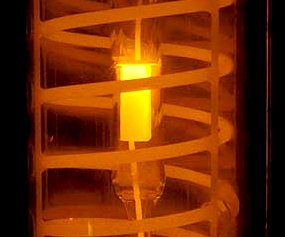New efficient processes and compact equipment will be necessary for the conversion and use of small natural gas resources from remote areas as well as for biomass utilisation. These technologies, will allow economic storage and transport of valuable products with high specific energy density.
Furthermore, biomass plants should fit to the landscape by limiting the plant dimension. Natural gas, obtained from oil platforms as byproduct of oil production, should not be burned to minimize the greenhouse effect as usually done (Methane has a greenhouse effect 20 times higher than the CO2, which is generated in course of the combustion).
Microreactors create an ideal situation for removing mass and heat transport limitations in synthesis reactions for production of useful fuels or chemicals.
Having in mind a production range of chemicals from several 100m³/h syngas, the Institute of Micro Process Engineering is focused on topics of catalyst integration into micro-reactors, optimization of reaction conditions as well as scaling up reactors from laboratory to a pilot plant size.
In the case of syngas generation we are focussing on reactor design and especially on an optimized autothermal process. Natural gas is partially oxidized and converted with vapor to hydrogen without needing a additional heating or cooling of the reactor. The topic is connected to topics of hydrogen separation with Pd-membranes
and reforming of methane
. The coupling of exothermic methane combustion and endothermic steam reforming with integrated hydrogen separation via membranes is used for further process optimization.
 Laboratory reactor for autothermal syngas production in operation at 1000°C in the laboratory of the collaboration partner SINTEF/NTNU
Laboratory reactor for autothermal syngas production in operation at 1000°C in the laboratory of the collaboration partner SINTEF/NTNU